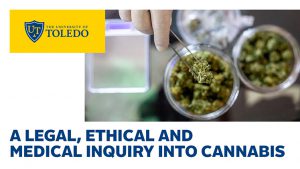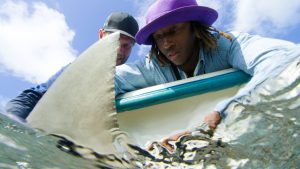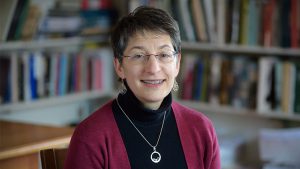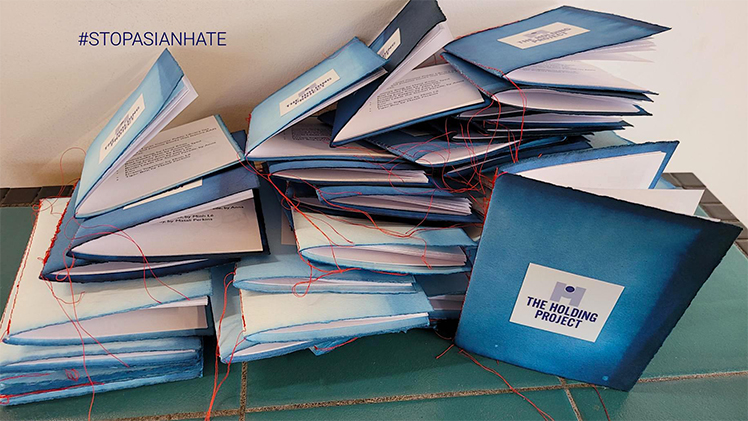Archive for April, 2022
Engineering Students to Present Senior Design Projects April 29
Tuesday, April 26th, 2022As their senior projects, two teams of engineering students at The University of Toledo designed indoor and outdoor walkers for a 6-year-old girl with a rare genetic disorder who weighs 22 pounds.
The graduating seniors used their problem-solving skills to help Bethany Rasmusson from Wood County live as independent a life as possible.
They’ll be presenting their final prototypes alongside more than 60 other team projects as part of the College of Engineering’s Senior Design Expo from noon to 3 p.m. Friday April 29, on the first floor of Nitschke Hall.
“Just from our first meeting with Bethany and her parents, we were intrigued and interested knowing that we could actually present a physical object to give her more freedom out in the world,” said Alexander Enders, a senior who graduates May 7 with a bachelor’s degree in mechanical engineering. “It’s a great thing to be a part of and makes me excited for the future.”
More than 200 students worked with local businesses, industries and federal agencies to help solve technical and business challenges, with projects ranging from a smart mailbox and a weapon detection system to a WiFi hacking system and a vibrating shoe insole that relieves foot pain.
Seniors will present their final prototypes, provide hands-on demonstrations and answer questions about their experiences at the expo.
Born with Wolf-Hirschhorn syndrome, Bethany Rasmusson of Pemberville wants to play outside with her big brother and big sister.
“Even though she is small, she’s so determined,” said Kelly Rasmusson, Bethany’s mother. “Because of Bethany’s size, it has been really difficult for us to find a walker that is safe for her. A lot of what’s out there is too heavy for her to move on her own just because of her low muscle tone and her small size. We carry her and she can crawl, but outside that’s a little bit difficult.”
Kelly and her husband Kurt Rasmusson connected with a UToledo alumnus, who connected them with faculty in the Department of Mechanical Engineering, who put together two teams of students to use their creativity and ingenuity to help give Bethany the mobility and freedom she craves.
On Thursday, April 21, the teams had their final meeting with Bethany’s family outside Nitschke Hall to test the prototypes and learn what adjustments needed to be made before the Senior Design Expo.
“It’s really exciting and makes her really happy, that’s for sure,” Enders said. “It’s great to see how well it works for the final test run, being able to have time to make alterations in the next week before we need to present our final project.”
“This has been a huge blessing,” Kelly Rasmusson said. “We had ideas, but the students were able to listen to what the problems were and fix them. We are so thrilled they were willing to take this on and make a walker that is light enough that she’s able to move around in and give her that freedom because that’s really what she wants. She wants to keep up with what everyone else is doing. It has been really humbling and heartwarming to see that these students were so eager to help her. We never, ever expected anything like this.”
Visit the College of Engineering website for information about all of the teams, projects and sponsors.
UToledo-Curated Exhibit About Feeling Safe Draws on Community Participation
Friday, April 22nd, 2022An interactive art exhibit curated by an art faculty member at The University of Toledo will be on display in Carlson Library through April 29 to facilitate community participation.
Barbara Miner, professor and chair of the Department of Art, along with community artist/author Lee Fearnside and Dr. Ashley Pryor Geiger, associate professor of humanities, helped develop the collaborative, interdisciplinary artwork that combines art, writing and social justice.
The exhibit, titled “The Holding Project,” was created in response to the rise of anti-Asian American and Pacific Islander violence and a sense that art could provide a space for community dialogue about feelings of safety and unsafety, and how these feelings about community shape and impact the lives of individuals.
“The Holding Project” is a large-scale concertina book composed of pages containing messages from people from all walks of life. Cards provided near the book ask each responder, “What makes you feel safe?” and “What makes you feel unsafe?”.
“The anonymous responses are not generic, but often deeply personal and tell the unvarnished, uncurated story of a community,” Miner said. “Some express outrage, fear and hatred. But most speak of love, family and respect for others.”
Initially, the exhibit was displayed at all 20 branches of the Toledo Lucas County Public Library where responses were collected. The curated book also was displayed at the Toledo Museum of Art Library in the UToledo Center for the Visual Arts, as well as the downtown arts celebration, Momentum, in September.
Miner said the project will continue to grow and share responses, continuing the dialogue that the project has begun. Smaller versions of the book will be presented to the library locations which generated responses. Eventually, the project will migrate into the digital space to make it available to an even larger, more diverse audience.
Author to Discuss Financial Cold War April 22
Thursday, April 21st, 2022The author of the book “Financial Cold War: A View of Sino-US Relations from the Financial Markets” will give a free, public lecture at The University of Toledo Law Center to discuss how international finance intersects with geopolitics and the role financial markets play in the rivalry between China and the U.S.
The event featuring James Fok is 6 p.m. Friday, April 22, in the McQuade Law Auditorium. Book sales and signing start at 5:30 p.m.
 Fok, whose book was published in December, is a financial and strategic adviser to corporations and governments. He served as a senior executive at Hong Kong Exchanges and Clearing from 2012 to 2021.
Fok, whose book was published in December, is a financial and strategic adviser to corporations and governments. He served as a senior executive at Hong Kong Exchanges and Clearing from 2012 to 2021.
Free guest parking will be available during the event in area 12.
Visit the College of Law website for more information about the event.
UToledo Hosting First Ohio Cannabis Symposium April 22
Wednesday, April 20th, 2022The University of Toledo is hosting its first “Ohio Cannabis Symposium for Attorneys, Medical Professionals and Entrepreneurs.”
“The business, employment and tax opportunities from cannabis are significant, as the market’s revenue is $150 billion annually,” said Brandon Cohen, senior lecturer in the John B. and Lillian E. Neff College of Business and Innovation. “This revenue and corresponding tax dollars provide significant wealth creation and resources for employment and social programs in the states where it is legal.”
The symposium, which will take a deep dive into the legal, ethical, scientific and business aspects of cannabis, is from 7:30 a.m. to 4:15 p.m. Friday, April 22, in the Thompson Student Union Auditorium.
 “The symposium provides a strong academic foundation for attendees to understand the history, legal, ethical, entrepreneurial and medical arguments for and against cannabis legalization,” Cohen said.
“The symposium provides a strong academic foundation for attendees to understand the history, legal, ethical, entrepreneurial and medical arguments for and against cannabis legalization,” Cohen said.
Pete Kadens, co-founder and former CEO of Green Thumb Industries and a Toledo native, will serve as keynote speaker for the event. Green Thumb Industries is currently the second-largest cannabis company in the world with a market capitalization of more than $6 billion.
Six CLE and CME credits will be awarded to attorneys and medical professionals in attendance.
A registration fee of $25 is required, which covers the cost of lunch and refreshments.
Visit the event’s website to register and view the agenda.
Shark Advocate, Wildlife Researcher to Deliver Commencement Address May 7
Monday, April 18th, 2022One year after competing on Discovery’s Shark Week series “Shark Academy,” an alumnus of The University of Toledo will return to campus to speak at spring commencement ceremonies Saturday, May 7, in Savage Arena.
Randy Thomas, a wildlife technician with the U.S. Geological Survey (USGS) in southern California who graduated from UToledo in 2019 with a bachelor’s degree in environmental sciences, will address 1,889 candidates for undergraduate degrees — 1,840 bachelor’s and 49 associate’s candidates. The undergraduates will be split into two ceremonies: 9 a.m. and 1 p.m.
The University’s graduate commencement ceremony and doctoral hooding are scheduled for 6 p.m. Friday, May 6, in Savage Arena, and will commemorate 819 candidates for doctoral, education specialist and master’s degrees as well as graduate certificates. Dr. Rhonda Foster, an alumnus of the UToledo College of Nursing and healthcare consultant and leader, will be the keynote speaker.
Tickets are required for admission.
“Rocket Nation is excited to celebrate our newest alumni and their successful academic journey as members of the Class of 2022 — a historic year as The University of Toledo celebrates 150 years of serving students and our community,” said UToledo President Gregory Postel. “We also are pleased to welcome successful alumni back home to share their experiences and insight to inspire our graduates and their families.”

Randy Thomas
Thomas, the speaker for the undergraduate ceremonies, is a wildlife researcher and educator whose passion for animals and endangered species has taken him to land and water habitats around the world, while working with government, private and nonprofit organizations committed to conservation.
Currently working for the USGS, Thomas conducts field and lab research on the endangered Mojave Desert tortoise and the surrounding desert habitat. In addition to his research, Thomas develops scientific and public awareness communications related to the USGS conservation efforts and educational programs.
At the Bimini Biological Field Station Shark Lab in the Bahamas, Thomas tagged sharks as part of research into population dynamics, movement patterns and behavior. He also serves as an ambassador and instructor with “Sharks4Kids,” a nonprofit organization that specializes in creating a new generation of shark advocates through access to a dynamic range of educational materials and experiences.
In 2021, Thomas was selected to participate in Discovery’s “Shark Academy” and worked on a research vessel for six weeks with a team of scientists engaged in great shark diving expeditions and research on one of the world’s most fascinating predators.
Thomas has taught water safety skills to children in Japan, worked for the U.S. Department of Defense in Bahrain as a child youth program coordinator and served as a marine science educator with the Pigeon Key Foundation in Key West.

Dr. Rhonda Foster
Foster, the graduate ceremony speaker, is a widely published healthcare consultant and leader who has served as an executive officer at leading academic medical centers, community hospitals and healthcare systems. With an expertise that focuses on the development of leadership cultures that support inclusion and engagement, she has provided executive consulting on quality improvement and transformational change in healthcare organizations across the United States and internationally in Brazil, Abu Dhabi and Qatar.
Foster has served as vice president for clinical services and chief nursing officer at Children’s Hospital of Los Angeles; interim senior vice president and chief nursing and patient services officer at City of Hope National Medical Center; interim chief nursing officer at St. Joseph Health Sonoma County; vice president of patient care services and chief nursing officer at Children’s Hospital of Michigan; and assistant vice president of women and children’s services at Mercy Health – St. Vincent Medical Center in Toledo.
Foster has served on a variety of regional, state and national advisory boards, including the Lucas County Mental Health Board, the Ohio Advisory Committee for the Maternal and Child Health Block Grant and the American College of Healthcare Executives Northwestern Ohio Advisory Board of Regents.
In 2019 Foster received the Outstanding Alumnus Award from the UToledo College of Nursing and in 2021 she was recognized by the Los Angeles Business Journal as a Women of Influence in Healthcare.
Foster earned an Ed.D. from Bowling Green State University, a master of science degree in nursing administration from Georgetown University, a master of public health degree from the Northwest Ohio Consortium for Public Health and a bachelor of science degree in nursing from UToledo.
UToledo’s spring commencement ceremonies will recognize graduates from the colleges of Arts and Letters; John B. and Lillian E. Neff College of Business and Innovation; Judith Herb College of Education; Engineering; Graduate Studies; Health and Human Services; Natural Sciences and Mathematics; Nursing; and University College.
The College of Pharmacy and Pharmaceutical Sciences will host its commencement ceremony 6 p.m. Saturday, May 7, in Savage Arena.
The College of Law will host its commencement ceremony 1 p.m. Sunday, May 8, in Savage Arena.
The College of Medicine and Life Sciences will hold its commencement ceremony 2 p.m. Friday, May 20, in Savage Arena.
UToledo to Renovate On-Campus Residence Halls
Friday, April 15th, 2022The University of Toledo will upgrade its on-campus living options for students through a new collaboration with a national student housing partner.
The UToledo Board of Trustees approved during its Wednesday meeting for University leadership to move forward with expanding its relationship with Collegiate Housing Foundation and American Campus Communities, which developed and manages Honors Academic Village on the northwest corner of Main Campus.
“We are looking forward to this opportunity to allow UToledo to significantly upgrade our campus residence halls in response to what our current students have asked for and what prospective students are looking for,” UToledo President Gregory Postel said. “We look forward to partnering with these leaders in the student housing industry to transform the on-campus living experience for our Rockets.”
The 35-year ground lease agreement will invest between $184 and $271 million, depending on changing market costs, in upgrades to campus residence halls and addressing deferred maintenance and existing debt. Collegiate Housing Foundation and American Campus Communities responded to a request for proposals process for UToledo’s campus housing operations.
Approximately $100 million will be capital investments in campus residence halls, beginning with a deep renovation of Presidents Hall.
The Presidents Hall renovation will take place during the next two years transforming the living spaces and providing increased flexibility with four-person, six-person and eight-person suites that feature modern design and furnishings, and the addition of kitchenettes. An addition to the building also is planned to add even more flexibility with single and double rooms for students looking to have that living option.
Multipurpose spaces also will be added for more study and social spaces in the building. University leaders have held several focus groups with students and are seeking additional input on what students want to see in the renovated building that is expected to open in fall 2024.
Plans will be developed to renovate UToledo’s additional residence halls through the partnership, which include International House, MacKinnon Hall, McComas Village, Ottawa Hall and Parks Tower. UToledo plans to close Academic House.
UToledo Reduces Fee for Students Outside Ohio to $100
Friday, April 15th, 2022The University of Toledo is making changes to its tuition structure to better attract high-performing students outside of Ohio to come to campus.
The Ohio Department of Higher Education recently approved UToledo’s request to reduce the out-of-state surcharge to $100 per semester for the 2022-23 academic year. The UToledo Board of Trustees approved the change at its February meeting.
“As part of our strategic efforts to grow enrollment and provide opportunities for more students to receive an amazing UToledo education, we need to increase our efforts to recruit students from outside our northwest Ohio region while continuing to be a school of choice for our neighbors in our community,” said Dave Meredith, vice president for enrollment management. “Reducing the out-of-state surcharge both reduces a financial barrier to enrollment and also improves the transparency of the cost and value of a UToledo degree.”
Students who are not residents of Ohio pay approximately $9,360 more per academic year to attend UToledo than in-state students. Currently, students with a GPA of 3.0 or higher receive an $8,000 discount, bringing the total out-of-pocket expense to $1,360.
This new program pilot for the upcoming year will charge a flat $100 surcharge per semester for qualifying out-of-state students directly from high school who enroll for the first time in fall 2022 with a minimum 3.5 GPA in high school.
UToledo will evaluate the pilot program in the upcoming academic year and if successful intends to seek approval from the state to continue the reduced fee moving forward.
UToledo Receives State Grant for Choose Ohio First Scholarships
Friday, April 15th, 2022The Ohio Department of Higher Education awarded The University of Toledo a five-year, $893,760 grant through the Choose Ohio First program to provide scholarships to academically talented, underrepresented minority students pursuing all majors in the College of Engineering.
Ohio Lt. Gov. Jon Husted and Ohio Department of Higher Education Chancellor Randy Gardner recently announced more than $42 million for 44 colleges and universities across the state to boost Ohio’s efforts to strengthen the state’s workforce in STEM-related fields while supporting an estimated 4,850 Ohio students.
“Employers express to us a desire to diversify their workforces,” said Dr. Lesley Berhan, associate dean for diversity, inclusion and community engagement in the UToledo College of Engineering and associate professor of mechanical, industrial and manufacturing engineering. “The Choose Ohio First grant will enhance our continued efforts to recruit, retain and graduate students to pursue careers in engineering — offering financial support, industry partnerships, mentoring, job training and leadership opportunities.”
Professional development is a central aspect of the program, Berhan said, and students will regularly interface with regional employers who are members of the UToledo Engineering Corporate Partners program.
“The Choose Ohio First scholarship is just one example of how Ohio continues to invest in growing our STEM talent,” Lt. Governor Jon Husted said. “We want our students to stay and work in Ohio. These scholarships will help young Ohioans gain valuable STEM skills, preparing them for one of Ohio’s many in-demand jobs and ensuring businesses have the talent they need to succeed.”
The Choose Ohio First scholarship program began in 2008 to increase the number of Ohio students enrolling in and successfully completing STEM programs at Ohio’s public and independent colleges and universities.
Students who receive a Choose Ohio First scholarship are required to participate in a work-based learning opportunity such as a STEM internship, co-op or research to help them transition effectively to the STEM workforce after graduation.
“These opportunities are possible thanks to the many business partners that work with our colleges and universities and their Choose Ohio First scholars,” Gardner said. “Those relationships create win-win situations for the students as well as the companies that may hire them as their future workforce.”
New Study Confirms Potential of Geoelectrical Methods in Search for Hidden Graves
Tuesday, April 12th, 2022Rather than digging to identify unmarked mass grave sites or evidence to locate missing persons, cutting-edge technologies are helping law enforcement agents, forensic scientists and historians uncover attempts to hide victims.
New research by geophysicists at The University of Toledo published in the journal Forensic Science International validates the potential of methods called electrical resistivity and ground-penetrating radar as useful tools in the search for clandestine graves, with mass graves having a stronger and different “geophysical signature” compared to individual ones.
Related results of the research also are published in the journal Frontiers in Environmental Sciences.
“While the entire search process ultimately requires excavating shallow graves to retrieve human remains as evidence to prosecute suspects and bring closure to families of victims, engaging in such excavation without useful leads on the exact location of the graves will mean excavating large areas, which is difficult, time consuming and destructive,” said Dr. Kennedy Doro, assistant professor in the UToledo Department of Environmental Sciences and lead investigator of the study. “It also could lead to altering the target evidence.”
Using an innovative experiment design of mass and individual graves with human cadavers willingly donated for scientific research, researchers used ground-penetrating radar, electrical resistivity tomography and electromagnetic imaging from the surface before the burial through six months after the burial.
Helping direct the final excavation to more definite areas, researchers can provide an underground picture or geophysical signature to identify areas with unusual signals that may be related to excavation and human decay.
Electrical resistivity is a fundamental property of a material that measures how strongly it resists electrical current.
Researchers found that resistivity increases immediately after burial and decreases as time goes by.
Ground-penetrating radar shows the position of the graves and the human remains as disturbed and curved reflectors; however, it is limited by the presence of rock fragments distributed within the soil at the site where this study was carried out.
The experiment was established in May 2021 and consists of a mass grave with six human remains, three individual graves and two empty control graves dug to the same size as the mass grave and individual graves.
UToledo led the geophysical study in collaboration with other scientists from the University of Toronto and Linnaeus University and forensic anthropologists at Texas State University, which operates a 26-acre human decomposition and forensic taphonomy facility located at the Freeman Ranch in San Marcos.
“These initial results validate the capability of geoelectrical methods in detecting anomalies associated with disturbed ground and human decay, while ground-penetrating radar is limited by the geology of the site,” Doro said.
Before starting to dig undisturbed ground, the team measured its electrical resistivity tomography, electromagnetics and ground-penetrating radar.
After excavating the land, the researchers analyzed soil profiles and added sensors at the grave sites to monitor changes in soil moisture, temperature and electrical conductivity.
“The availability of advanced tools and techniques with high accuracies, capable of covering a large investigation area within a short time without necessarily altering the target evidence, is crucial to the success of forensic investigative searches,” Doro said. “Most previous studies in this direction only assessed individual graves using pigs as proxies for humans. We used both individual and mass graves as well as human remains donated for science.”
‘Reproductive Rights and Justice Beyond Roe v. Wade’ Topic of April 13 Lecture
Monday, April 11th, 2022A national expert on the reproductive rights movement will discuss how Roe v. Wade has had an outsized place in the understanding of reproductive rights as part of The University of Toledo College of Law’s Cannon Lecture series.
Dr. Felicia Kornbluh, a professor of history and gender, sexuality and women’s studies at the University of Vermont, will give her free, public lecture, titled “Both Sides: Reproductive Rights and Justice Beyond Roe v. Wade,” at noon on Wednesday, April 13, in the McQuade Law Auditorium at the Law Center.
 Kornbluh will draw upon the findings in her latest book, “A Woman’s Life is a Human Life: My Mother, Our Neighbor, and Reproductive Rights and Justice — New York and the Nation.” The forthcoming book, which is being published by Grove Atlantic Press, is a history of reproductive politics that starts with a pair of neighbors on the eighth floor of a New York City apartment building.
Kornbluh will draw upon the findings in her latest book, “A Woman’s Life is a Human Life: My Mother, Our Neighbor, and Reproductive Rights and Justice — New York and the Nation.” The forthcoming book, which is being published by Grove Atlantic Press, is a history of reproductive politics that starts with a pair of neighbors on the eighth floor of a New York City apartment building.
Kornbluh’s research has followed her mother and her neighbor, Dr. Helen Rodríguez-Trías, into the feminist law-reform campaigns in which they made their most renowned contributions, efforts to decriminalize abortion in New York State that succeeded three years before Roe, and a campaign to regulate surgical sterilization in New York City that resulted in national regulations from the then-Department of Health, Education and Welfare, which has since been renamed the Department of Health and Human Services.
“We are excited to welcome Dr. Kornbluh,” said Rebecca Zietlow, associate dean for academic affairs at the College of Law. “She is a nationally known expert on the history of the reproductive rights movement and a well-respected professor of history and gender studies.”
Kornbluh publishes regularly for the scholarly and popular press, most recently publishing on abortion rights and the federal courts for The American Prospect, the Washington Post and The Forward. Kornbluh teaches the history of feminism, the history of U.S. law, the U.S. since 1945 and American Jewish history.
She also serves as chair of the board of directors of the Planned Parenthood Federation of America-Vermont Action Fund, which is on the verge of adding a Reproductive Liberty Amendment to the state constitution. Since moving to Vermont in 2009, Kornbluh has served as director of Gender, Sexuality and Women’s Studies at the University of Vermont, president of the university’s faculty union and a member of the state Commission on Women.
Kornbluh received her bachelor’s degree from Harvard-Radcliffe and her Ph.D. from Princeton.
The Cannon Lecture Series was established in 1980 to honor former Toledo attorney Joseph A. Cannon. The series hosts nationally known individuals who explore both the humanistic dimensions and limitations of our legal system.


